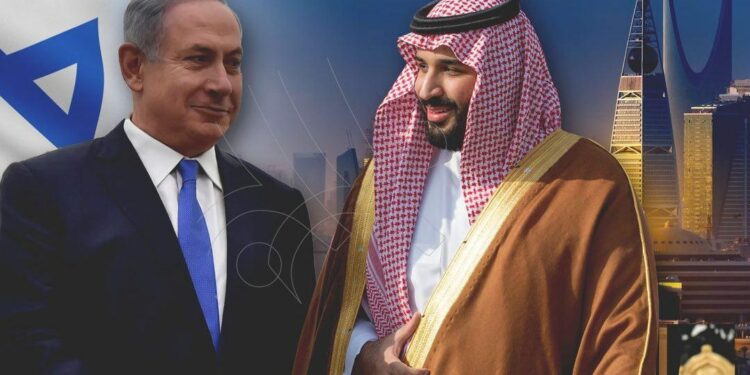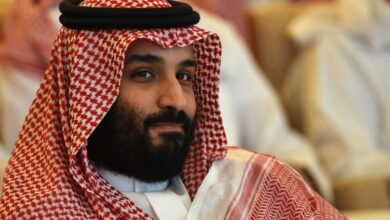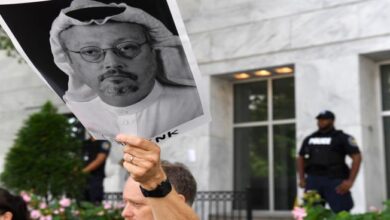When will Saudi Arabia normalise relations with Israel?

The two oil rich nations of the UAE and Bahrain were the first to declare a normalisation of ties with Israel, moves that turned all eyes towards the Gulf’s heavyweight, Saudi Arabia.
Under the de facto leadership of Crown Prince Mohammed bin Salman (MBS), Riyadh has begun developing a rapprochement policy with Israel, making no secret of its intentions to ally with Tel Aviv against Tehran.
But the brutal killing of Saudi dissident Jamal Khashoggi in the country’s consulate in Istanbul, as well as the repeated setbacks in the Riyadh-led Yemen war, have decreased MBS’ political leverage.
Despite the crown prince’s warming to hardliner Benjamin Netanyahu, King Salman, his father, has continued to maintain an anti-Israel stance. This is the clear obstacle standing in the way of Riyadh’s normalisation with Tel Aviv.
A number of different sources and experts believe that MBS is now waiting for his father’s death before any moves are made.
“It may be the case that MBS will await the death of the king, and his own succession, before making such a move,” Richard Falk, an international law professor and a prominent expert on turbulent Middle East politics, told TRT World.
Other sources also voice similar thoughts to Falk.
“He is testing the waters and preparing Saudis for what is coming next once he becomes king,” says an anonymous Saudi adviser to Riyadh, according to the Wall Street Journal.
Two close confidantes of the crown prince also told the WSJ that MBS intends to reach a deal with Israel but that he is aware of the fact that it is almost impossible “as long as the king is alive.”
Yoel Guzansky, who was a former director of the Iran and Gulf desk on Israel’s national security council, also thinks that Riyadh’s recognition of Israel is just “more a matter of when and not if.” The “when” appears to be tightly tied to the ascension of the crown prince to absolute power after his father’s death.
Last week, US President Donald Trump indicated that Riyadh will recognise Israel “at the right time.”
What MBS wants
Several other indications coming from Saudi Arabia signal that MBS is serious about normalising relations with Israel.
When Jared Kushner, Trump’s son-in-law, and the presidential envoy for the so-called Deal of the Century, pressed MBS to join the UAE normalisation deal with Israel during a palace meeting on September 1, the crown prince said that his father would not agree to the demand. This is according to the WSJ.
Something else was offered to Kushner, though – that Riyadh could have a hand in persuading Bahrain to join the deal. Bahrain has since normalised ties with Israel.
Another strong indication of MBS’s desire to recognise Israel is his clear instructions to the country’s top media organisations and their respective editors, directing them to publish positive coverage over the deal and urging them to define it as “historical and honourable.”
What else is Riyadh waiting for?
MBS also wants to gauge reactions from the Arab world before making this next political move towards Israel, experts say.
“My assumption is that Saudi Arabia is waiting to see whether there are any adverse reactions to the moves made by UAE and Bahrain. Of special concern to Riyadh is whether there is any serious anti-regime activism in Saudi Arabia or the countries that took the normalisation steps,” says Falk.
“If they do it before there’s a clear consensus among Arab states [over normalising their relations with Israel], they’ll make themselves a lightning rod,” for criticism emerging from the Arab world, said David Rundell, a former senior US diplomat, who worked in the Saudi kingdom in the past.
After the recent normalisation deal, both the Arab world and the Middle East appear to be in disarray. Some countries, like Turkey, Iran, Algeria and Qatar, have voiced strong opposition, expressing their backing of the Palestinian cause, while others like Egypt and Oman appear to reinforce the UAE-Bahrain position.
Another factor for Riyadh’s delay to follow suit could be related to the upcoming US elections in November.
“The outcome of the US election in November could be a factor working in either direction: early normalisation to help Trump; deferred normalisation to avoid alienating Biden or if it seemed as though Trump would lose the election,” Falk says.
Trump and his Israeli allies can use the normalisation deal as political leverage for the president’s re-election campaign, arguing that he is able to achieve a peace agreement that no other American leadership was until now ever able to realise.
“We’re here this afternoon to change the course of history,” Trump said, during the signing ceremony of the deal last week.
“After decades of division and conflict, we mark the dawn of a new Middle East,” he claimed.
By: TRT World





